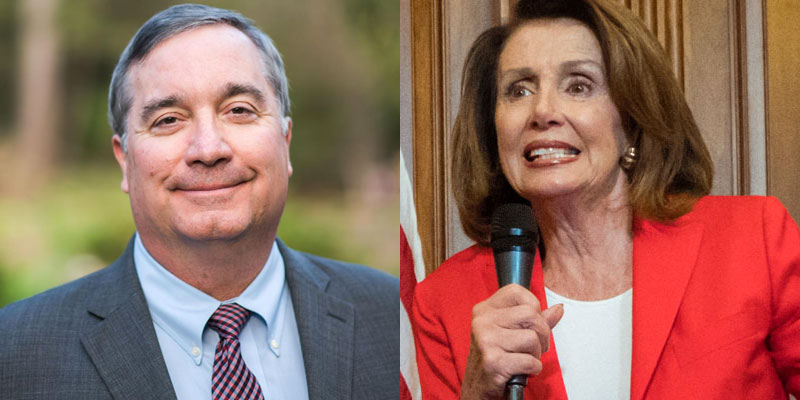Speaker Nancy Pelosi has a prescription for high drug prices, but this is one case where the cure is worse than the disease.
Her plan would let the federal government set the prices that Medicare and private health plans pay for drugs. This means that a marketplace now regulated by competition and consumer choice would be ruled by government price controls, and that would not be a positive change for patients, our country or our future.
If Congress wants to tackle the issue of affordability, it should at least reform a system that currently enriches Pharmacy Benefit Managers (PBMs) at the expense of the patients Pelosi claims she wants to help.
Outrageous fortune
PBMs and insurers currently pad their own bottom lines with rebates from drug manufacturers — some as high as 30% of the retail prices patients pay for their prescriptions. The Trump administration proposed earlier this year to help seniors on Medicare, and end this abuse, by making these middlemen pass-along the savings to patients.
PBMs and advocates funded by insurance interests pushed back on this idea, and you won’t find it in Pelosi’s bill. Her proposal does nothing to require PBMs and insurers to give up this cash cow and put these rebates in the pockets of patients who need them.
Instead, Pelosi focused on measures like price controls that threaten what’s working best about our system — namely, the innovations that improve the lives of patients and actually lower medical costs for the country overall.
Unintended consequences
We don’t have to guess what will happen if Pelosi’s plan passes. In countries where governments control drug prices, they also effectively control consumer options and access.
A recent Wall Street Journal editorial noted the effect that price controls have had on access to new treatments in other countries: In the U.S., 89% of new medicines introduced between 2011 and 2018 are available to consumers. Compare that to 62% in Germany, 60% in the U.K., 50% in Japan and 48% in France.
Granted, the difference between an older treatment and a newer treatment is sometimes a matter of degree. A newer treatment, for instance, may not necessarily be more effective for everyone, but it may create fewer side effects. We understand that this is no small concern for patients experiencing bad side effects. Would you want to tell those patients to suck it up for the cause of saving money?
In some instances, the treatments that other countries have delayed offering their citizens are game-changers — like the immunotherapy treatment that saved former President Carter’s life after he was diagnosed with melanoma that had spread to his brain. Carter was lucky that the immunotherapy treatment was available in the U.S. at his time of need; in some countries, the same treatment wasn’t made available until many months later. People with advanced cancer may not have months to wait on these kinds of groundbreaking treatments.
Under Pelosi’s plan, that’s what we can expect — restricted or delayed access to medical breakthroughs. The good news, by her way of thinking, is that the price will be right. The bad news is that, for a lot of people, it won’t matter.
Equally concerning is the impact on the future development of breakthrough treatments. History has consistently proven that government price controls will discourage innovation and investment in pharmaceutical research, to the detriment of patients and our economy.
Destroying jobs while driving-up costs
More than 4 million U.S. jobs are supported by the biopharmaceutical industry. In Alabama alone, the industry and its supply chain support 14,300 jobs and $4 billion in annual economic output. According to some estimates, Pelosi’s plan could cost Alabama 2,500 of those jobs and $720 million of that annual economic output.
And here’s the kicker: What Pelosi and others are proposing would not bring down the costs of healthcare in the U.S. In fact, it would do the opposite.
Despite what you hear in political talking points, prescription drugs account for just 10 – 15% of total healthcare spending in the U.S. The bulk of healthcare spending is on other things, like hospitalizations, procedures and doctor visits.
What politicians don’t like to acknowledge is that medications play a key role in keeping those other costs in check.
A 2017 report from the American Legislative Exchange Council, “Price-Fixing Prescription Drugs Will Cost Us in Cures,” cited national research on the positive financial impact of the Medicare Part D drug program. Among other things:
- Hospitalizations decreased 8% when patients had prescription drug coverage.
- Prescription drug coverage resulted in $4 trillion in cost savings, by lowering healthcare utilization over time.
So, the plan is to stifle an industry whose products not only help people, but drive down health costs? This makes no sense.
The proven solution
As the ALEC report concluded: “Free-market incentives for the discovery of more life-saving medications are what the U.S. needs to bring down the cost of both prescription drugs and the cost of healthcare over the long term.”
There are, of course, many valid concerns about health costs. The advent of the Affordable Care Act has driven up the costs of premiums and allowed insurers to shift more costs to patients. When real people talk about high drug costs, that’s what they’re usually talking about: the ever-higher copays and deductibles that are increasingly a reality affecting us all in the U.S. marketplace.
That’s a problem largely created by government mandates, and it’s worth solving. Pelosi should focus on solutions that truly help patients — such as reining-in PBMs’ abuse of the rebate system. Instead, Pelosi’s plan is fixated on government controls that will ultimately reduce competition, choice and life-saving innovation — and will cost us, in every sense of the word.
Dan Roberts is a member of the Alabama State Senate from Mountain Brook representing Senate District 15













